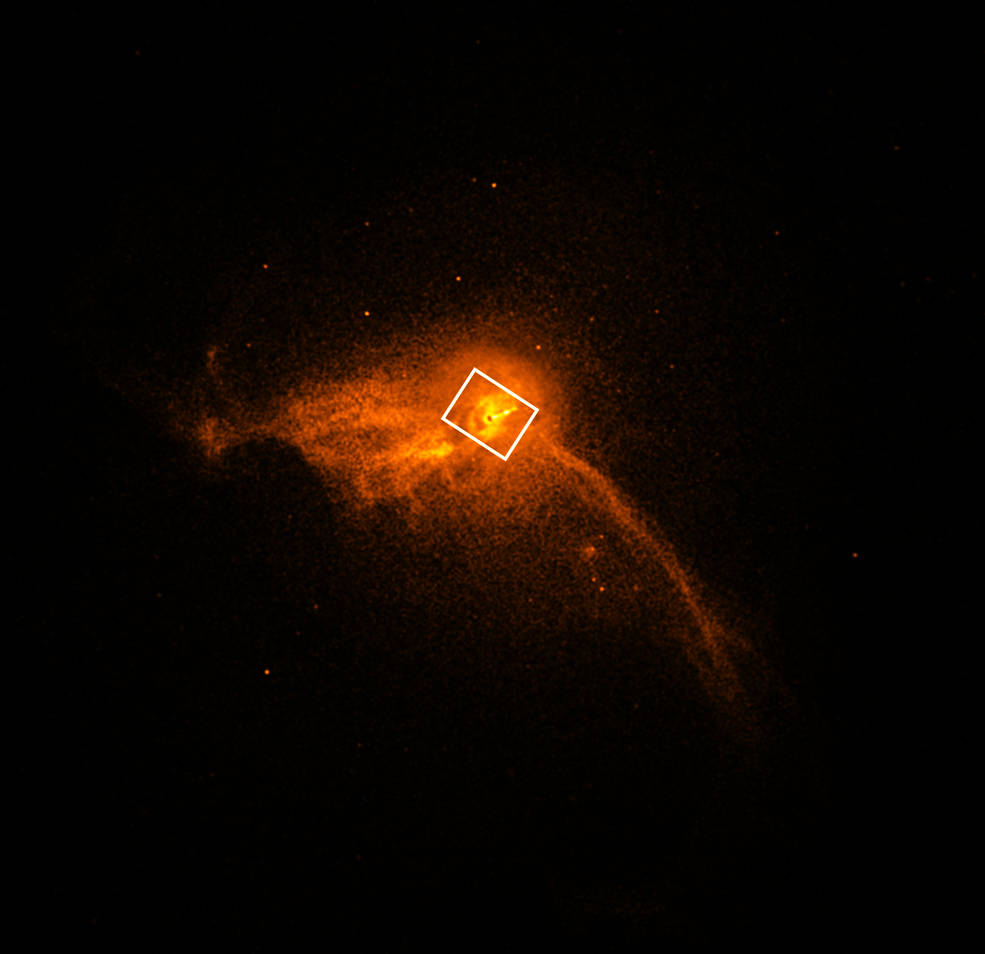Black hole is a celestial body that packs extremely high mass in a very small space. Presence of such great mass makes the gravity of a black hole so powerful that even light can not escape its gravitational pull. Because light can not escape it, a black hole appears — well, black! In fact black hole could be the blackest body in the universe.
A black hole can merge with other black holes and can also absorb other stars to keep growing in mass. Such black holes with mass equivalent of the millions of Suns, are called supermassive black holes.
Most of the galaxies have one or more supermassive black holes at their center.
Black Hole Image
On 10 April 2019 an international network of radio telescopes called the Event Horizon Telescope (EHT) captured the first ever direct image of a black hole. This image shows the shadow of black hole at the center of a galaxy called Messier 87 (M87). The M87 galaxy is about 55 million light-years away from our planet Earth.
Being completely black, a black hole cannot be seen as such. Its presence is detected by observing the substance around it.

What is Singularity?
Singularity is the point in spacetime where the gravitational force is infinite. At the center of the black hole where all the absorbed matter is compressed, a singularity is created. The laws of spacetime do not work at the singularity because of infinite gravity. Even time stops completely at the singularity.
Black Hole and Time
Time slows down inside a black hole. The time will pass slower with respect to an observer outside the black hole. This phenomenon is called gravitational time dilation. Time gets slower when measured closer to the center of gravitational force. This has been proven when atomic clock measured faster time at a high altitude in comparison to the clock placed on Earth’s surface.
Because gravitational force at the singularity is infinite — it has been theorized that time will completely stop at a singularity.
Black Hole Closest to Earth
HR 6819 is the nearest known black hole to Earth. It is located about 1120 light years away from the Sun. Discovery of HR 6819 was announced in May 2020. This black hole is located in a star system that is visible to the naked eye. HR 6819 is a small black hole with mass equal to 6.3 Suns.
Who Discovered the Black Hole?
It was Albert Einstein who, in 1916, first predicted the existence of something like black hole. Einstein’s General Theory of Relativity gave rise to the theory of black holes. The term “black hole“ was coined by John Wheeler in December 1967. It was suggested to Wheeler by a student during one of his lectures. Cygnus X-1 (abbreviated Cyg X-1) is considered to be the first black hole discovered. Cyg X-1 was discovered in 1964.
What is the Black Hole Made of?
A black hole “swallow” anything and everything that comes too close to it. The extremely high gravity completely shreds all the substances before engulfing the matter and light. Therefore, it is very difficult to say what exactly black holes are made of — they may hold their mass in a form that is not yet known to us.
What is Event Horizon?
Event horizon is the limit around a black hole beyond which we can not see any event anything happening. Beyond the event horizon, the escape velocity of the black hole becomes greater than the speed of light. In other words, anything that crosses the event horizon, will not be able to escape the gravitational force of the black hole. As a result, even light can not escape the pull of black hole once it crosses the event horizon.
Black Hole in the Milky Way
The Milky Way is the name of galaxy in which our solar system is located. There is a supermassive black hole, called Sagittarius A*, at the center of Milky Way. Sagittarius A* (pronounced “Sagittarius A-Star”, abbreviated Sgr A*) has a mass equal to 4.3 million Suns.
Use the citation below to add this article to your bibliography
"Black Hole: Facts about the Most Powerful, Densest, Blackest Thing in the Universe." Dashamlav.com. Web. 30 April 2025. <https://dashamlav.com/black-hole-facts-image-singularity-event-horizon/>
Dashamlav.com, "Black Hole: Facts about the Most Powerful, Densest, Blackest Thing in the Universe." Accessed 30 April 2025. https://dashamlav.com/black-hole-facts-image-singularity-event-horizon/
"Black Hole: Facts about the Most Powerful, Densest, Blackest Thing in the Universe." (n.d.). Dashamlav.com. Retrieved 30 April 2025 from https://dashamlav.com/black-hole-facts-image-singularity-event-horizon/
